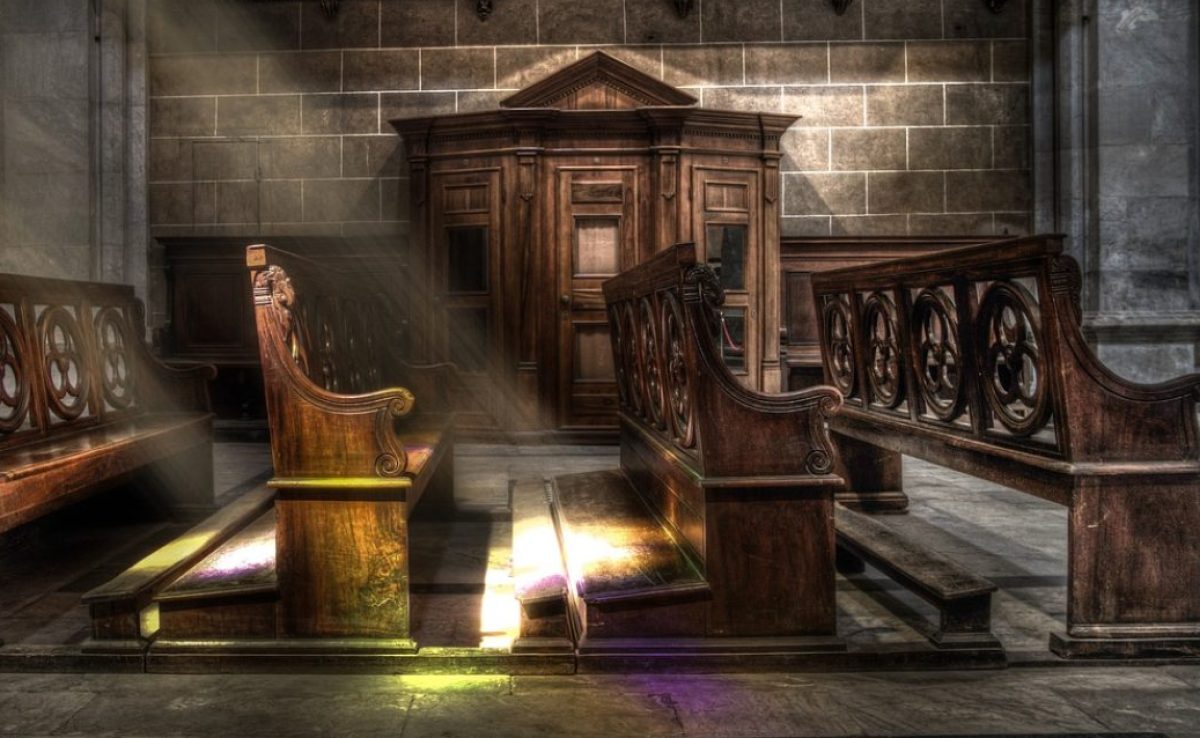–
Recently, I have been blessed to have numerous conversations with trusted friends and family members about biblical matters. With all that was discussed, one thought kept coming to the forefront and has weighed heavily on my mind. Here it is . . .
Most people will not be saved.
We have a very real problem on our hands within the church today. The preaching, teaching, and belief of many is that salvation is an easy or simple proposition. Yet, when we read Scripture, we clearly see that it isn’t.
One of the biggest culprits of our time is the “easy believe” doctrine of salvation. Using a verse or two—a “proof text,” if you will—to prove the point is often how false teachings arise. In this case, people may quote a text like Romans 10:9 and simply leave it at that:
“If you declare with your mouth, ‘Jesus is Lord,’ and believe in your heart that God raised him from the dead, you will be saved.”
While Paul’s statement is obviously true, it is not the only thing we must consider. Again, the problem is that, all too often, this text (or another) is used, and we go no further. This is why so much time is spent talking about people who just “got saved,” as though everlasting life is something we can forever secure in an instant.
That is, salvation is reduced to simply accepting the (true) proposition that Jesus is Savior. Just say a prayer or come to the altar and, voilà, the work is done . . . now and forever.
Don’t misunderstand me; coming to repentance and giving your life to God is the first critical step in salvation. But it’s just that: a step. The problem is that, for many professed Christians, there is a failure to recognize that there is a life to be lived thereafter.
A life to be lived, indeed.
As I will describe in this article, salvation is a continuous process . . . and it is anything but easy. In fact—and as the Bible describes things—most people who claim to be saved will not be.
The path of salvation is not wide but is very narrow.
_____________
OT Examples of the Narrow Path
There are so many examples that could be mentioned, so let’s focus on just a few.
The events surrounding the Great Flood prove that most people will not be saved. Of all the people living on earth in the days of Noah, we understand that only eight (eight!) of them were found to be worth saving (Gen. 6:9-10, Heb. 11:7).
What does that say about percentages? Very, very few were found to be righteous.
The same thing appears when Abraham pleaded with God to spare the corrupt city of Sodom (Gen. 18). After numerous back and forth efforts, it was revealed that not even ten righteous men could be found! Only Abraham’s nephew, Lot, and his family would be spared (19:15). Infamously, we know that even Lot’s wife “looked back” and was caught up in the destruction (19:26).
Again, very few were righteous.
This same story repeats itself time and time again with the nation of Israel. Whether we are dealing with Korah’s rebellion, God’s initial determination to destroy the entire group (except Moses and Aaron), the generation that was lost in the wilderness wanderings, the exiles into Assyrian/Babylonian captivity, and everything in between, it is evident that few were ever righteous. In fact, the entire period of Judges—like almost every other part of Israel’s history—can be summarized with these grim words:
“Everyone did what was right in his own eyes” (21:25b).
This is also why the OT continuously speaks about God preserving a “remnant” for His people.
We even read throughout the prophets how the sacrificial assemblies, the priesthood, and the gatherings themselves were often fantastically corrupt. Many Jews were going through the motions of their “faith” but were far from God.
This was made evident by the prophet Amos when he said:
“I hate, I despise your feasts, and I take no delight in your solemn assemblies” (5:21).
Isaiah went so far as to make this claim, which Jesus later echoed about the Jews of his day:
“These people come near to me with their mouth and honor me with their lips, but their hearts are far from me. Their worship of me is based on merely human rules they have been taught” (Is. 29:13, Mt. 15:8).
It’s crystal clear: most people throughout the OT—whether Jewish or not—were not saved. As I will now show, the NT reveals the same thing about our present world.
_____________
NT Examples of the Narrow Path
The NT is replete with examples of where salvation cannot be reduced to a mental affirmation or a singular proposition. In fact, the words of Jesus and the apostles unanimously affirm that relatively few will be saved.
Stated in reverse, most will be condemned.
For brevity’s sake, I will simply summarize several places where this is evident. I leave it to your discretion if you wish to read the entirety of the passages.
For starters, Jesus’ Parable of the Sower speaks to this point (Mt. 13:1-9). The “seeds” all fall in one of four places: 1) The Path 2) The Rocky Soil 3) Among the Thorns and 4) The Good Soil.
Of the four possible outcomes, how many of them end up prospering; that is, how many grow to produce a crop (this connotes being saved)? Most readers likely know the answer to this question: one. One in four people go on to be saved and produce a good crop, and that’s including many who began to grow (accepting the word) but then petered out.
While we should not literally view this to mean that exactly 25% of people will be saved, it does affirm that the number is small: much smaller than those who will be condemned.
Elsewhere, Jesus makes this even more clear. In speaking the Parable of the Wedding Feast (Mt. 22:1-14), he describes that many “invitations” will be sent out in preparation for this great event. This is an allusion to Christ’s return and the consummation of his Kingdom on earth (Rev. 19:6-9). Of the vast number of people invited, few came ready for the event.
As Jesus summarized it: “For many are called, but few are chosen” (Mt. 22:14).
If this isn’t clear enough, consider Jesus’ words from earlier in the Gospel of Matthew:
“Enter through the narrow gate. For wide is the gate and broad is the road that leads to destruction, and many enter through it. But small is the gate and narrow the road that leads to life, and only a few find it” (7:13-14).
Do you now see? Even still, I must mention that this matter goes much deeper.
The NT is equally clear that many who fill our churches are not—and will not be—saved. While we cannot personally judge one’s salvation—though we can judge their fruits (Mt. 7:20)—a hard truth confronts us. Any given day, the number of those who claim to follow Christ is not directly proportional to the number of people who will be saved. Put more plainly, many people falsely believe in their eternal security.
Jesus spoke directly to this, as recorded in Matthew 7:21-23:
“Not everyone who says to me, ‘Lord, Lord,’ will enter the kingdom of heaven, but the one who does the will of my Father who is in heaven. On that day many will say to me, ‘Lord, Lord, did we not prophesy in your name, and cast out demons in your name, and do many mighty works in your name?’ And then will I declare to them, ‘I never knew you; depart from me, you workers of lawlessness.”
In this, we see that salvation stretches beyond one’s outward appearance and ministerial accolades. Matthew Henry’s Commentary summarizes this matter rather effectively:
“Christ here shows that it will not be enough to own him for our Master, only in word and tongue. It is necessary to our happiness that we believe in Christ, that we repent of sin, that we live a holy life, that we love one another. This is his will, even our sanctification.”
This may be one of the most profound mysteries of the faith: that one can—by all outward appearances—be a sincere child of God, while inwardly being a child of Satan.
Perhaps this should not be a surprise though, as even Satan “masquerades as an angel of light” (2 Cor. 11:4). As Paul further revealed, Satan’s followers also masquerade as “servants of righteousness” (11:5). Can you say, religious narcissists?
Words cannot accurately convey the treachery and stealthiness of the Evil One.
_____________
Conclusion
There is much more that could be said about this, but I trust that the point has been made.
The Bible is clear, from front to back, that most people walking the earth are not (and will not be) saved. This means that most the world stands condemned. This is exactly why the apostle John revealed the following:
“We know that we are from God, and the whole world lies in the power of the evil one” (1 Jn. 5:19).
While the children of God remain hidden in Him, most of the world remains under Satanic captivity. This is simply reality, and it comes straight from Jesus and the biblical writers themselves. In all this, we see that the “easy believe” mentality is a heresy that has, is, and will continue to lead many down to the pit.
As Jesus said, each of us must carry our cross and follow after him (Mt. 16:24-26). As Paul said, each of us must “work out (our) own salvation with fear and trembling” (Php. 2:12b). As James said, we must prove our faith by our deeds (2:18).
We must have refined hearts, pure intentions, forgiven transgressions, and a passion to pursue the truth in all we do. If you are not serious about your faith and making Christ your ultimate priority, then now is the time to do so.
Broad is the path that leads to destruction and narrow is the path to life. Few will find it.
–


This content would preach my friend. Thanks for sharing.
LikeLike
Thanks brother, I’m glad it resonated with you!
LikeLike
“Narrow is the path” No truer words. Thanks for the message!
LikeLike
Thanks Jorge! I hope you are well, sir.
LikeLike
Excellent!
LikeLike
Thank you, Julie! I appreciate your continued support over the last couple of years.
LikeLiked by 1 person